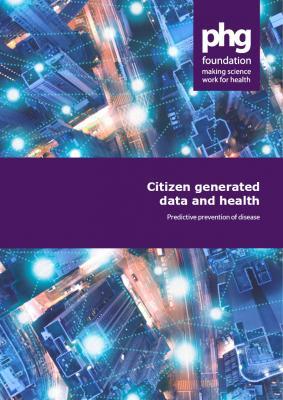This autumn, UK government publication The future of citizen data systems set out plans to make better use of citizen data. The foresight report, intended to support the National Data Strategy, highlighted a wide range of opportunities to harness citizen generated data for economic and social benefits. It outlined steps to ensure that the UK would be well placed to benefit from these, adapting to changing circumstances, and to minimise the risks.
Citizen generated data and health: predictive prevention of disease examines in detail the prospects for using CGD for health, and specifically to support predictive prevention of disease – an approach that uses science and technology to offer a more personalised assessment of risk and targeted interventions to keep people well, for longer. This is widely acknowledged to be vital for a sustainable NHS.
CGD for health comes from a host of sources outside the health system, not only privately purchased medical testing but also personal monitoring of health indicators such as blood pressure, heart performance sleep and exercise, often via mobile apps and sensors. It can even include data not usually thought of as containing health information – for example, certain patterns of social media engagement or online search activity can predict worsening mental health.
Citizen generated data and health: predictive prevention of disease sets out the potential for CGD to support improved disease prevention efforts, and also suggests constructive policy steps to enable development. Echoing the broader conclusions of the recent UK government report on citizen data, the report advises the need to maintain active public engagement; to be transparent about risks and benefits; and to develop connected, agile systems that can adapt swiftly to new technologies and data sources.
External Affairs Director, Phillipa Brice, commented: “In recent months we have all become more aware that non-medical data can have profound implications for infectious disease control. In fact, we could be using citizen data much more widely to aid prediction and prevention of common diseases too – but we need to work closely with the public to understand the best way forward.”
